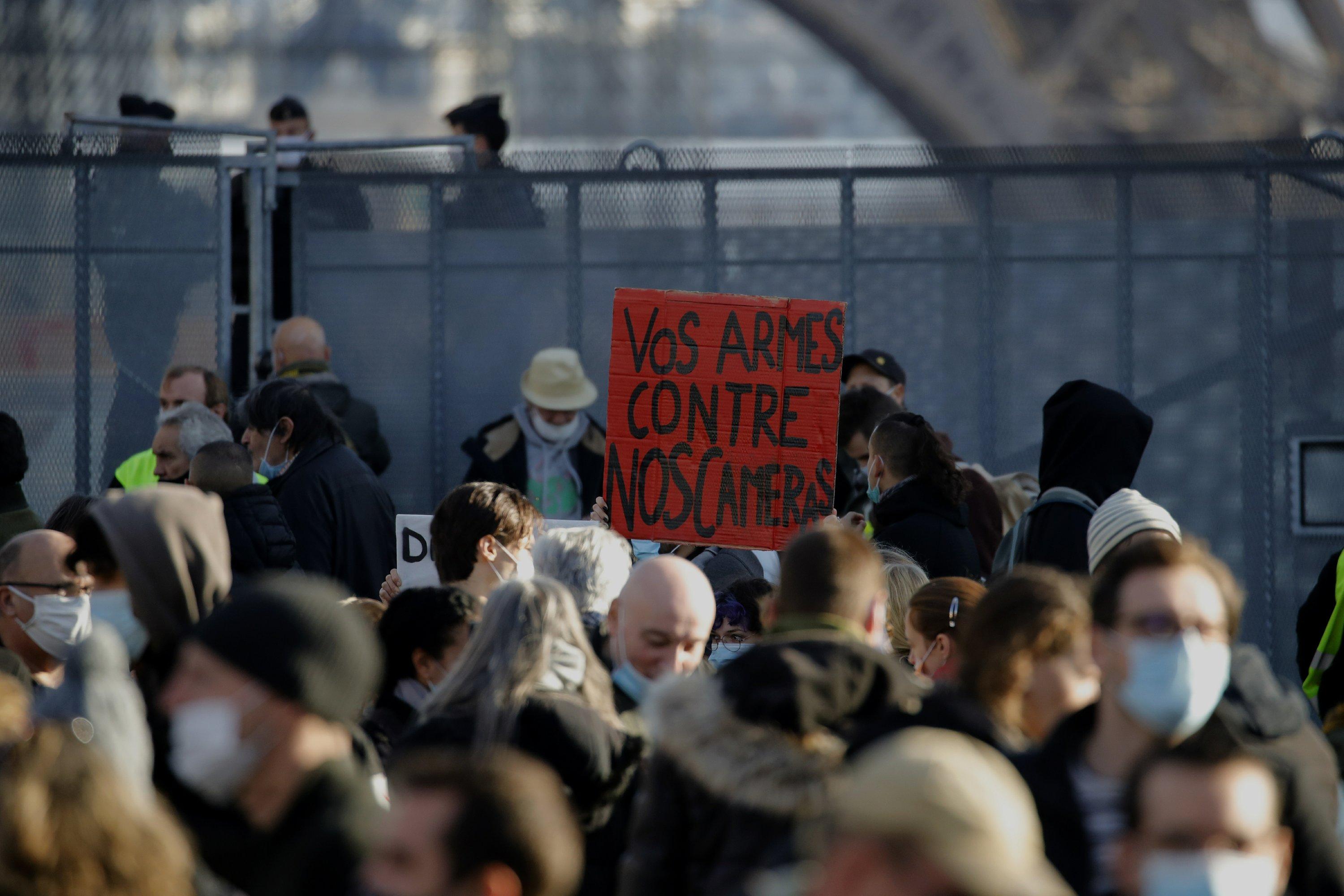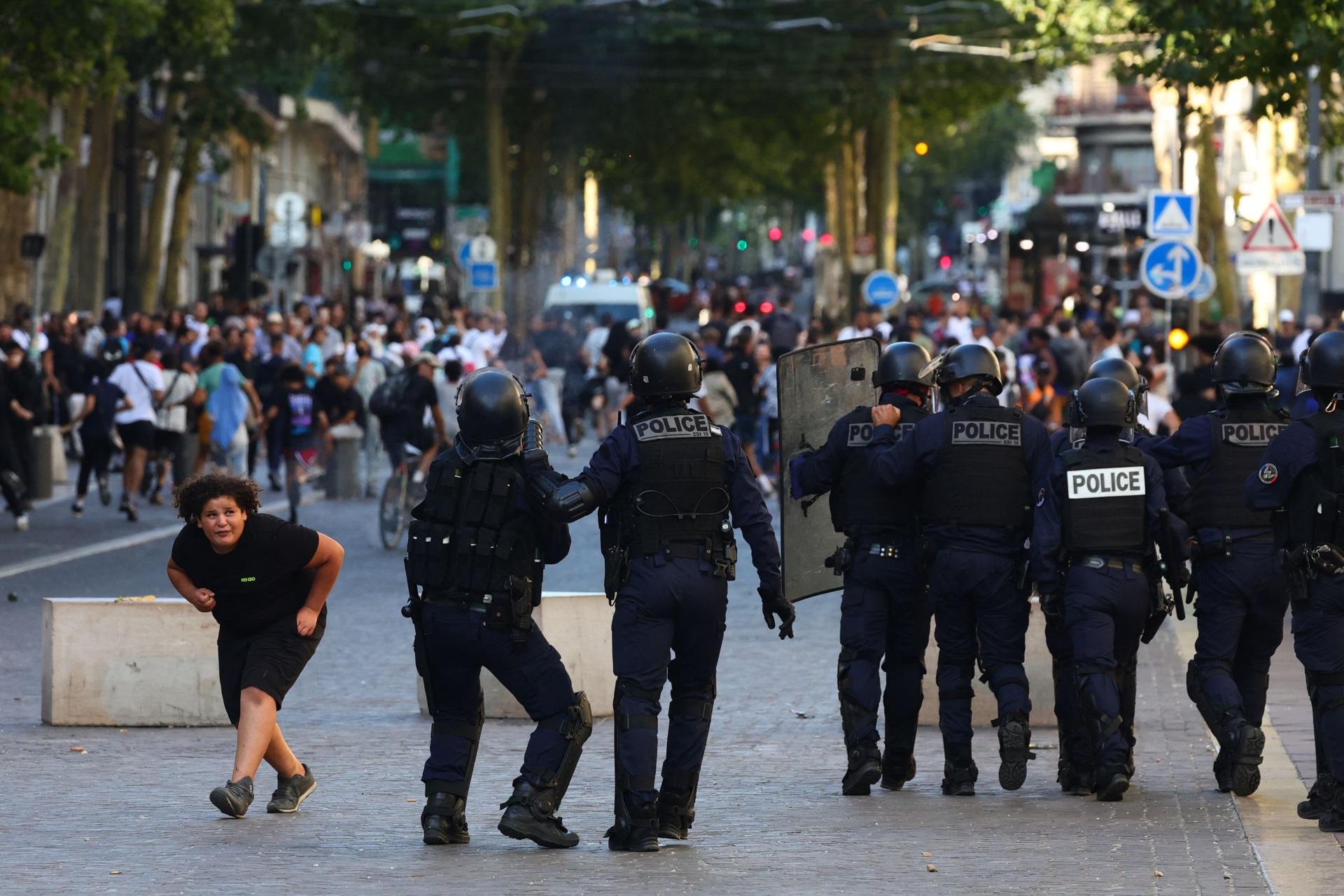Macron’s election campaign stumbles as wave of violence hits France Teen killings, shootings and deadly protests
POLITICO released an article discussing the rising violence in France and the possible setback for Macron's party in the European elections. Caliber.Az reprints the piece.
Emmanuel Macron is facing a perfect storm.
Over the past few weeks, teenager-on-teenager killings, drug-related shootings, a heightened terror threat and deadly protests in the overseas territory of New Caledonia have dominated the airwaves, spelling trouble for the French president and his European election campaign.
Macron is trying to persuade voters to support his pro-EU vision for a strong bloc with France at its centre. But he’s already fighting an uphill struggle, with Marine Le Pen’s far-right National Rally (RN) consolidating its substantial lead over Macron’s party in the polls.
Now, the succession of headlines about security fears has further derailed Macron’s strategy as the June 9 European Parliament election draws near.

“Today, if you ask your parents, grandparents or friends what they’re talking about, it’s not Europe, it’s what happened in the Eure department,” where gunmen killed two prison guards in an ambush on a police van, said Benjamin Haddad, from Macron’s Renaissance party. “It’s our responsibility to show that even on these sorts of issues, Europe can play a role, for example with cooperation mechanisms to find fugitives.”
Long-term trends surrounding crime and violence are on a downward trajectory in France. But the spectacular nature and rolling media coverage of the violence have driven public debate and effectively blocked Macron’s camp from making a big push on their pro-EU credentials.
While recent shocking and violent events are not obviously connected to each other, the stream of news stories has provided inflammatory material for the far-right campaign.
A 15-year-old boy was stabbed to death in the central French city of Châteauroux in April after allegedly refusing to give his phone to the attacker. The alleged suspect was a boy of “Afghan origin,” a source close to the investigation told French news agency AFP. That led the far-right National Rally’s president to call for a halt on immigration from Afghanistan, including for asylum-seekers, with a sweeping claim that this population brought “no added value to French society.” The attacker’s mother allegedly participated in the deadly assault.
“These stories are a source of concern for the French population,” Renaud Labaye, the general secretary of the National Rally group in the National Assembly, told POLITICO. “It is our opinion that elected officials must offer political solutions to the concerns of the people who elect them.”
At stake is not just the makeup of the European Parliament and the direction of EU lawmaking tilting to the right, but also potentially the future of France: Polling puts Le Pen on course to win the next presidential election in 2027 and a resounding victory for the National Rally next month would catapult her toward the Elysée.
It’s about security, stupid
It’s not as if the president hasn’t tried.
Earlier this year, Macron appointed 35-year-old Gabriel Attal as prime minister with hopes of giving his beleaguered second term a fresh start and putting a tough — and popular — adversary up against the RN’s own millennial rising star, Jordan Bardella.
The French executive brandished its support for Ukraine against the Russian invasion, adopting an increasingly hawkish rhetoric and doubling down on accusations that the far-right sympathizes with the Kremlin. “One has to wonder if Vladimir Putin’s troops aren’t already in our country — I’m talking about you and your side,” Attal told the RN’s three-time presidential candidate Le Pen in February.

Later that month, Renaissance’s lead candidate for the EU election, Valérie Hayer, described her campaign as being the “only pro-European campaign” and said she would seek to protect Europe against Russia’s Putin and his “allies” within the Union.
But in the eyes of French voters, European themes and Ukraine continue to appear as distant issues. In one Odoxa poll of 1,000 people conducted on May 15-16, just a tenth of those surveyed listed the war in Ukraine as one of three factors which would influence their vote in the EU election, while more than a third (35 per cent) mentioned security.
“The French are significantly more concerned with security within their borders than they are with global security,” said Erwan Lestrohan, a research analyst for the polling firm Odoxa. “This is an election cycle, dominated by domestic issues, which lands halfway into Emmanuel Macron’s presidency and can be seen by voters as a midterm vote.”
Though Macron’s government is pulling out all the stops to portray itself as being tough on crime, the Odoxa poll showed 70 per cent of those surveyed judged the state’s action on security matters as being “insufficient.” EU election polling estimates the far-right National Rally (RN) will receive over 30 per cent of the vote next month, with Macron’s Renaissance list stuck around 16 per cent and at risk of being surpassed by the centre-left, Socialist-party backed list of European Parliament candidates.
“The far-right has the most to gain when security matters are put at the heart of the political debate,” said Christian Mouhanna, a French sociologist whose research focuses on security.
In 2002, Mouhanna said, the RN’s campaign largely focused on crime and insecurity, which had marred the outgoing socialist Prime Minister Lionel Jospin’s campaign. Even positive economic results during Jospin’s time in office didn’t help much.
Two days before that vote — during a silence period when candidates are asked to suspend their campaigns and media cannot discuss electoral matters — a 72-year-old retiree was robbed and beaten at his home. The shocking nature of the incident and the intense coverage which followed made security a key theme with hours to go before the vote.
It was seen as linked to far-right candidate Jean-Marie Le Pen’s second-place finish in that contest.
Images of violence have been widespread in France over the past year, starting with the clashes across the country last summer after a 17-year-old was fatally shot by a police officer. Last month, a 15-year-old was beaten to death in a Parisian suburb, allegedly by four young men aged 17 to 20. A few weeks later, a 22-year-old was killed, allegedly by two teenagers who had ambushed him after luring him in through a dating site.
While the notion that France is turning into a more violent society is disputed by researchers, that won’t necessarily be enough to save Macron’s campaign.
“Concern on security is highly tied to current events,” said Lestrohan, from pollsters Odoxa. “It’s always strong but spikes when an event draws a national emotion.”








